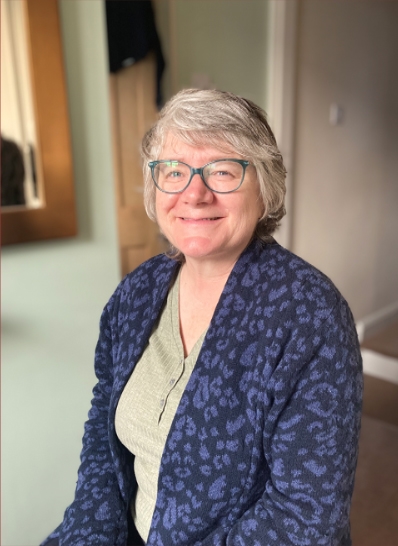Thanks to everyone who attended Beat SCAD’s virtual event on 13 February looking at SCAD and wellbeing.
Dr Colette Soan, an educational psychologist at a local authority and a lecturer at the University of Birmingham, who has had two SCADs and a diagnosis of FMD (Fibromuscular Dysplasia), led the first part of the session. She started by saying it’s normal to have an emotional or psychological reaction to a SCAD event and everyone responds differently.
She explained what is meant by psychological impact, including anxiety, depression and post-traumatic stress.
Colette (pictured) and colleagues Zoe Capper, Lydia McTigue and Bethany Williams, reviewed research literature that discussed SCAD. They found that in the past decade the number of papers published has increased dramatically, which means there is more knowledge about SCAD in the healthcare community.
The team looked at what was discussed in the papers about mental health and psychological rehab for SCAD patients.
One research paper suggested there were higher scores of anxiety and depression closer to the point of SCAD, when the SCAD survivor was younger and when they were peripartum. A more recent study found there was no difference between P-SCAD (pregnancy-related) patients and other patients in terms of the level of anxiety and depression.
According to one study, 38.5% of SCAD patients had a history of depression or anxiety and around half experienced an intense emotional experience or stress prior to their SCAD event.
SCAD patients who attend cardiac rehab tend to have higher scores for anxiety and depression than non-SCAD patients prior to attending rehab. About 75% of patients indicated they experienced an emotional benefit from attending rehab.
The research tells us that things which help recovery include recommendations from primary care providers (eg cardiologist), SCAD-specific programmes, and online patient education and support groups.
Positive changes
Colette then discussed post-traumatic stress leading to post-traumatic growth, where patients make positive changes following a trauma.
She finished with a lovely mnemonic (pictured right) to help us remember to look after ourselves.
Cardiac rehab survey
Beat SCAD Trustee Karen Rockell discussed the Beat SCAD cardiac rehab survey, which has given us some really interesting data about how SCAD patients experienced cardiac rehab. Although some patients felt isolated because other patients tend to be a lot older and have atherosclerotic heart disease, in the main they found it beneficial.
Of the 242 people who answered the survey:
- 42% said rehab helped them feel mentally and physically more confident.
- 33% of those who attended rehab were offered a talking therapy, but this is not available in all areas because rehab offerings are different across regions.
- 76% said they continued their exercise after rehab, which is a great figure as it is so important for our wellbeing.
- 67% said they would recommend rehab to a new patient.
- However, 14% of respondents weren’t offered rehab, which is an area Beat SCAD plans to address.
Buddy service and wellbeing resources
Trustee Sarah Coombes then discussed the wellbeing support available to SCAD patients, families and friends, including Facebook groups, resources on our website and the Buddy Service.
The service, which was launched late last year, offers one-off or ongoing support and signposting for SCAD patients. Buddies are ‘experts by experience’ who have been through a SCAD and can help support patients through the early days after their diagnosis.
Many thanks to Colette, to her colleagues Zoe, Lydia and Bethany, who analysed the research, and to Sue Morris, Honorary Senior Lecturer: Applied Educational and Child Psychology at the University of Birmingham, who provided some helpful insights. We hope those who attended the event found it useful.
You can watch a recording of the event on our Youtube channel here.

